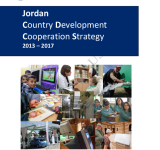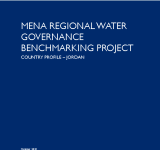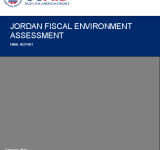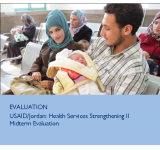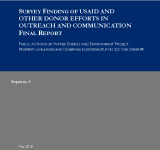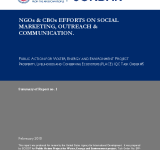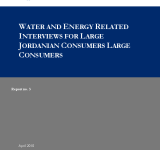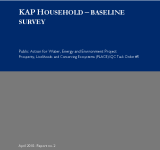Defining the goal as improved prosperity;; accountability and equality for a stable;; democratic Jordan;; the strategy report highlights a long-standing partnership between Jordan and the United States. Amidst a number of challenges;; Jordan continues to play a strategic ally in the region and therefore;; the report stresses the importance of assisting Jordan in carrying out its stated commitment to broad-based political and economic reforms. The three development objectives are 1. Broad-based;; inclusive economic development accelerated;; 2. Democratic accountability strengthened;; and 3. Essential services to the public improved;; with a special development objective of gender equality and female empowerment enhanced. According to the report;; the key theme of the strategy is complementing support for Jordanian-led structural reform with grassroots activities of more visible and more directly “felt” people-level impact. The development objectives find specific areas of focus that need the USAID investments and support.
management
The report is a Jordan country profile of the Regional Water Governance Benchmarking Project (ReWaB) and the results assessment of the project. The ReWaB is a project that aims to establish a system of water governance capacity and performance benchmarking for Middle East and North Africa countries. The report resents the projects' approach to water governance benchmarking;; brief overview of the political;; economic;; and social situation in Jordan;; the country's water availability;; and it also outlines the main users and managers of Jordan's limited water resources and identifies relevant trans boundary issues. With a description of the main actors in Jordan's water governance and their influence on functional performance;; the report presents and discusses the main findings of the Policy and Legal Analysis and the expert-based assessment;; which gauged the functional effectiveness of the Jordanian water sector and application of good governance processes in water-related decision-making. The report concludes by highlighting Jordan's organizing and building capacity and strategic planning in policy documents. It also notes areas with potential challenges such as the broad function of allocating water and mechanisms for water trades and complimentary conflict mitigation.
The assessment report is a final product of the Asia and Middle East Economic Growth Best Practices project (AMEG);; which is designed to support USAID missions in developing effective and efficient economic growth programs that address technical and strategic challenges. The report provides an introduction to Jordan's macroeconomic performance and structure and examines the field assessment's key lines of inquiry such as fiscal environment;; taxation;; customs and trade facilitation;; the energy sector;; policy analysis and political economic environment. It identifies the structure and performance of each inquiry and adds policy;; administrative;; and institutional environment;; and its challenges and opportunities.The report's concluding section outlines key challenges and opportunities;; and offers recommendations. Some of the findings include Jordan's lack of robust forum for soliciting and integrating input on economic policy issues from key stakeholders or the wider public and lack of institutional capacity to develop macroeconomic models. The report suggests facilitating national dialogue and consensus building on economic policy issues and building capacity to integrate stakeholder input.
The report presents the findings;; conclusions and recommendations of a midterm evaluation of Health Systems Strengthening (HSS) II;; a five year (2009-2014);; $73 million USAID-funded project. The strategy of the HSS II is to institutionalize strengthened health systems in support of reduced fertility rates and improved women's health. It works with the public health sector;; namely the Ministry of Health;; the Royal Medical Service and the Jordan University Hospital. The report finds that the project has met 13 of its 23 targets for year 3 and is on track to meet all its objectives by the end of the project. Expected results are public sector initiatives in safe motherhood and reproductive health. The HSS II project;; with its close ties with the Ministry of Health for its responsiveness to health needs and integrated approach to health delivery;; has strengthened critical health systems through its support to health management information system;; renovations;; accreditation;; referrals and capacity-building. The report recommends the USAID to negotiate the removal of a requirement that midwives be supervised intrauterine device insertion;; advocate for innovative incentive schemes and varying salary grades that reward midwives and doctors providing FP services and revise project indicators to reflect health outcomes and impact. Further recommendations include continuing support of a broad-scale mass media behavior change and communication campaign and programs that build on gains in maternal and neonatal health.
The report is based on the outreach and communication survey of USAID and other donors' efforts. It is part of the Public Action Project;; which supports USAID's technical and policy investments in the Jordanian water and energy sectors and specific initiatives in the environment. The survey was designed to report on past;; current and planned donor efforts in relation to water;; energy and solid waste management – with the main focus on water sector. It is intended to help the PAP team to design communication strategies and specific behavior change campaigns by building on lessons learned from outreach efforts. The report is based on the survey consisting of 39 open-ended interviews with donor officials and managers of donor-funded projects;; and it includes analysis and recommendations on coordination with current and planned donor projects. The report recommends improvement in coordination through development of national communication strategies;; assistance in water and energy sectors to establish trust and credibility with their customers;; reduction and streamlining of programs targeting schoolchildren;; and setting up of priority areas for change through technical assessment in water and energy.
The report is based on the findings of the survey that was designed to review NGO/CBO experience in communication/outreach and assess the capability of individual staff in the relevant NGOS and CBOs. The primary goal of the project is to institutionalize social marketing practices in NGOs and CBOs;; because organizations in the forefront of development depend on their ability to reach target groups and remove barriers to change. The research was conducted as part of the Public Action in Water;; Energy;; and Environmental Project to initiate and establish clear and identifiable behavioral changes amongst the Jordanian public and decision-makers;; to lead to increased efficiency in the use of water and energy;; and to improve solid waste handling practices. The main findings of the research identify sources of funds and grants of the NGOs;; their major activities and partnerships. The report also suggests training for successful fundraising;; social marketing and media campaigns for the NGOs and continued surveys and interviews of the NGOs.
The report aims to better understand and quantify the attitude and the levels of awareness amongst large consumers of water and energy;; and it presents the findings of the interviews conducted with a representative sample of large consumers to better understand trends and behaviors related to water and energy consumption. The research was conducted as part of the Jordan Public Action in Water;; Energy;; and Environment Project (PAP) under the Prosperity;; Livelihoods;; and Conserving Ecosystems (PLACE);; which aims to initiate and establish clear and identifiable behavioral changes amongst the Jordanian public and decision-makers. The study categorizes large consumers into a number of main sectors including hotel and restaurant sectors;; commercial sector;; hospitals;; government buildings and industrial sector;; and the field surveys were collected as a random sample of different industries;; state and commercial buildings. The research finds that the majority of large consumers neither monitor their water nor their energy consumptions via sub-metering scheme;; showing that the majority of large consumers are not able to accurately determine the areas within their establishments that are the most consuming. This finding identifies four major obstacles in implementing the water and energy saving practices including;; lack of awareness;; lack of incentive programs amongst employees;; higher prices for higher quality savings devices and lack of proper maintenance.
The report is based on the KAP household baseline survey;; which measures the current awareness of methods of water and energy conservations to determine how the Jordanians currently dispose of their household waste and how serious they believe the threat of global warming to be in Jordan. The household baseline survey on the use of water;; energy;; and the management of solid household waste has been designed based on the Knowledge;; Attitude and Practice (KAP) model;; and it aims to serve as a prelude to education and changing public behavior in the water and energy sectors in Jordan;; and to supply specific initiatives in the environment;; in particular in regard to the management of solid household waste. The research is based on a qualitative research;; a questionnaire and semi-structured interviews. The report concludes with the main findings that the most trusted sources of information on water conservation were the Ministry of Water and Irrigation;; and the Jordan Water Company. The survey finds that the respondents believe that the water shortage can be overcome with the water authorities' leadership including their engagement in grand projects.
